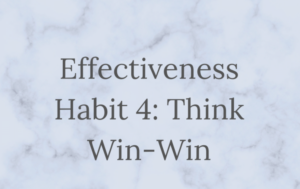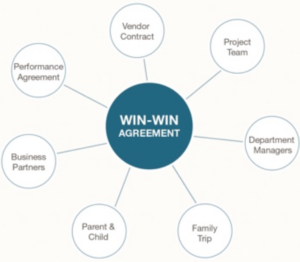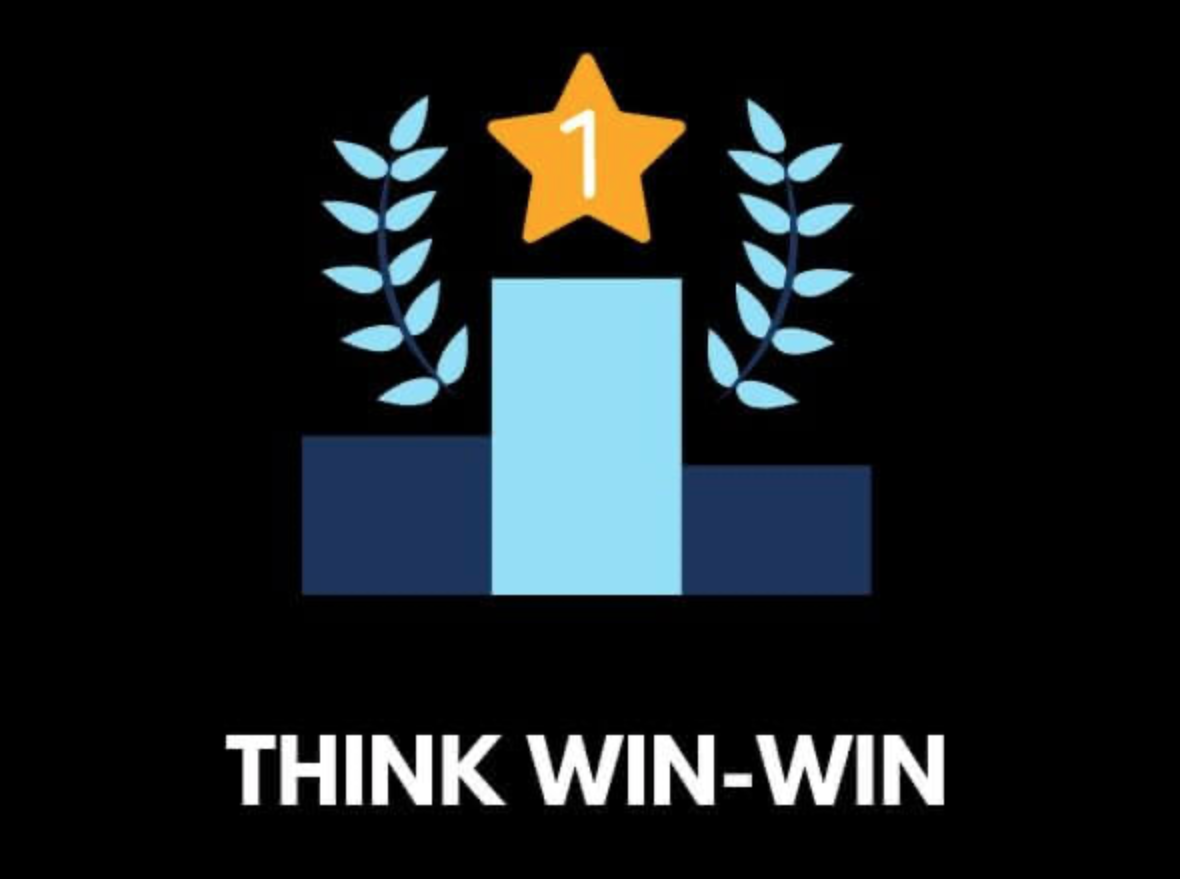
You’ve read now how to be more self-aware, and how to act more on what you can control/influence instead of what you cannot. You’ve read how to then envision where you want to go, and how to lead your team to envision their path as well. This way they can be more aware of what things they need to do differently today, to help lead their way to that person. You’ve read about time management techniques that will help you put these focuses at the pinnacle of everything, versus wasting time on things that will only set you back.
This habit is about the relationship building aspect. For me, this hits home more in the work setting. We all grew up in an environment where there is a winner, or loser. I know this was the case for me, especially coming from an athletic background. I used to run cross-country, and did track. I always was comparing times, and how to be the best I can be in order to eliminate the competition. If you think about it, it’s like that in a lot of work environments. We create this notion that there are very few spots for people to be ‘winners’. This also creates scenarios where people do not do very nice things in order to get ahead, which ultimately sheds light on ethics and character.

When you really think about it, there is a lot of opportunity to share the stage of successes. This is where we need to start to think differently. I’d be a liar if I told you that I always thought this way, because I didn’t. I still struggle with it because it’s how we are hardwired. Being bendable on ideas, or resolutions for some embodies weakness. Why? Especially when it’s going to make your life, and their life better. We tend to spite ourselves at times in order to feel like we ‘won’. That’s probably not a good method.
This can show up in many scenarios. Business deals, schedules with staff, maybe even as something as simple as planning a family vacation.
The example I’ll use is scheduling for team. Lets say you have a team member that’s burned out. You recognize they’re burned out, and they’re mentioning wanting additional time to rest- why not work with them? Pepper in some additional days off, allow them to work from home for a little, make them take a vacation, etc. Someone with the winning/losing mentality may feel like they’re going to lose (if they grant them this time off) because their business is going to fail and fall apart without this individual. They might feel like they won (if they deny the time off), because that’s the schedule, and they need to work it- suck it up! What happens when that individual leaves the company from not being happy. You just lost someone valuable to your company, and that person now doesn’t have a job for a bit until they find a new opportunity (lose/lose). Why not work together to help support both focuses? Why not come up with a third solution that you both didn’t think of originally?
I think this Win-Win mentality is pretty neat as well, because after looking at endless examples, those who practice this have the following principles/qualities (which the book shares as well):
- Integrity: Sticking with your true feelings, values, and commitments
- Maturity: Expressing your ideas, and feelings with courage, while also being considerate to the feelings and ideas of others
- Abundance Mentality: believing there is plenty for everyone
These principles/qualities are something to admire. I think you’ll agree if you really begin to sit and thank about it. The last example that comes to mind to me is performance based conversation with your team. This is a real life example. For confidentiality, I’ll say this individuals name is Todd. Todd was an average performer, but was inconsistent at times. Even though this individual was inconsistent, Todd wanted to learn different areas of the business. In all transparency, we might say no to this when an individual isn’t currently pulling their weight for what they’re supposed to be doing. The leader has two choices. Choice one is to ignore the request, and tell them they’re not meeting expectations in their current assignment. Then let them know if they make progress, you’ll revisit the idea. Option two is to sit and understand the request. The leader did something unconventional and listened to the request. In the conversation, the leader did express that expectations were not being met consistently. However, they also want the associate to feel valued and learn something else they might be passionate about. Expectations were set about this opportunity. It needed to be taken seriously, and improved performance needed to happen on the current assignment. The associate agreed.
The associate took the opportunity to learn this new aspect of the business. What happened? Todd flourished. Todd became one of the best in this new opportunity, and also showed huge improvements in his original assignments. The leader thought win-win. They thought this individual should still have opportunities to learn, and grow (sticking with true feelings, and values), they expressed their concerns while being respectful to the wants of Todd. Todd is succeeding, and is rising.
I do understand this outcome won’t happen with everyone. However, before your react to an event or situation, analyze the scenario and think through if there is a third outcome that can make everyone happier. It’s a decision that can dramatically impact your business for the better.

